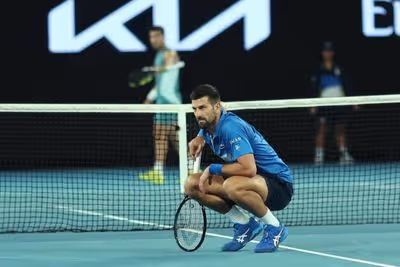
Djokovic’s relentless use of body language and on-court provocation could tilt the U.S. Open semifinal in his favour, while Alcaraz’s improved mental armour makes the match competitive. For bettors: favour Djokovic as match-winner or lay value on a four-set result; consider markets sensitive to momentum—total games/sets or Djokovic moneyline rather than a straight-sets punt.
Alcaraz vs Djokovic: Body Language Could Be the X-Factor in U.S. Open Semifinal
When Carlos Alcaraz steps onto Arthur Ashe Stadium for the U.S. Open semifinal, it won’t just be skill that determines the outcome but the psychological duel across the net. Novak Djokovic is as forensic in his readings as he is fluid in his movement, dissecting opponents’ tells — the way they drink water, breathe or interact with their box — and using those signals to steer the match.
Two Matches in One: The Visible and the Invisible
Tennis is often two contests at once: the technical exchange and the mental chess. Alcaraz has learned this the hard way, notably after a draining loss to Djokovic in Melbourne when he let Djokovic’s hamstring and body language derail his focus. Since then the Spaniard has tempered his sunny demeanour with steely focus, blending exuberance with ruthless on-court control.
How Top Players Weaponize Body Language
Players use outward expression deliberately. Fist pumps, shadow swings, animated warmups and clinched jaws are not mere emotion; they are tools to intimidate or reassure. Legends such as Rafael Nadal and modern archetypes like Aryna Sabalenka convert physicality into psychological leverage. Sabalenka’s team even developed a mantra around her intensity: don't fight it, don't feed it.
Coaching and Sports Psychology in Practice
Experts and coaches train players to modulate signals. Some, like Kevin Anderson, practiced fist pumps; others work with sports psychologists to make emotion an asset rather than a liability. Positive displays can boost testosterone and adrenaline; controlled anger may sharpen purpose and energy. Conversely, inconsistent or revealing body language can telegraph doubt and hand opponents a mental edge.
Recent U.S. Open Examples
The tournament has been a primer in expressive tactics: Amanda Anisimova credited improved presence after a Wimbledon collapse; Taylor Fritz tapped into crowd-fuelled fist pumps against Djokovic; Lorenzo Musetti used visible energy even while trailing; and Naomi Osaka kept focus while an opponent managed injury. Djokovic himself mixes provocation, crowd work and controlled displays to unnerve foes.
Why Consistency Matters
Sports psychologists stress consistent responses. Sudden shifts in demeanour — changes in routine, how a player drinks or looks to the coach — become tells. Once a player controls these small signals, they can selectively amplify them to unsettle an opponent. Djokovic’s mastery lies in both reading these cues and manipulating them when it serves him.
Betting Implications: Markets to Watch
This psychological subplot alters betting dynamics. Markets will respond to pre-match demeanour, in-play momentum and visible fatigue or swagger. Practical angles: - Match winner: Djokovic’s history of getting under opponents’ skin often nudges markets toward him, especially in tight lines. - Set betting: Given both players’ ability to rebound, four-set outcomes can carry value rather than assuming a straight-sets finish. - Prop markets: Total games, set handicaps and in-play momentum markets may offer opportunities as on-court body language shifts. - In-play strategy: Watch for visible fatigue or breakdowns in routine; these are stronger signals than pre-game form for in-play trades.
Conclusion: Mind Games Could Decide the Classic
This semifinal promises elite shotmaking and a high-stakes mental battle. Alcaraz’s improved self-management counters Djokovic’s long-standing skill at psychological manipulation, making for a contest where small behavioural margins could decide big betting moves and the match outcome.
In their last Grand Slam match, Carlos Alcaraz got absorbed by Novak Djokovic's condition. At the U.S. Open, he is learning to ignore it.
 Theathleticuk
Theathleticuk



